Fast Facts
- When: 12th August 2023 to 25th May 2024
- Where: Various, Final at Hampden Park, Glasgow
- Watch: BBC Scotland
- Official Website: Scottish Cup
The Scottish Cup or Scottish Football Association Challenge Cup to give its full title is Scotland’s oldest and most prestigious club cup competition. The first tournament was held in 1873/74 with just 16 teams competing. The first final was held at Hampden Park then as it is today.
The competition itself is the second oldest association football tournament in the world behind only England’s FA Cup. The Scottish FA Cup trophy however is the oldest of its kind in world football, given to the first winners at the 1874 Final and every year since.
The 2023/24 season is the 139th running of the tournament but who will be lifting the old trophy when it comes to Hampden in May?
Existing Customer Free Bets & Money Back Offers
On selected Scottish Cup matches, Betfred's Double Delight and Hat-trick Heaven offer may apply to single bets placed pre-match, in-play, or both, on the first or next goalscorer.
If you bet pre-match on the first scorer in these games and they score twice, you can get double your odds. If they score a third you can get treble the odds. The same offer applies to in-play bets, referring to the next goalscorer and goals scored after that point.
Scottish Cup Fixtures: Final
Saturday 25th May
- 15:00 Celtic v Rangers
Event Stats
Last 10 Scottish Cup Finals – 2014 to 2023
| Date | Winner | Score | Runner-Up |
|---|---|---|---|
| 3rd June 2023 | Celtic | 3-1 | Inverness CT |
| 21st May 2022 | Rangers | 2-0 | Hearts |
| 22nd May 2021 | St Johnstone | 1-0 | Hibernian |
| 20th Dec 2020 | Celtic | 2-2, 3-3 AET, 4-3 pens | Hearts |
| 25th May 2019 | Celtic | 2-1 | Hearts |
| 19th May 2018 | Celtic | 2-0 | Motherwell |
| 27th May 2017 | Celtic | 2-1 | Aberdeen |
| 21st May 2016 | Hibernian | 3-2 | Rangers |
| 30th May 2015 | Inverness CT | 2-1 | Falkirk |
| 17th May 2014 | St Johnstone | 2-0 | Dundee United |
Schedule
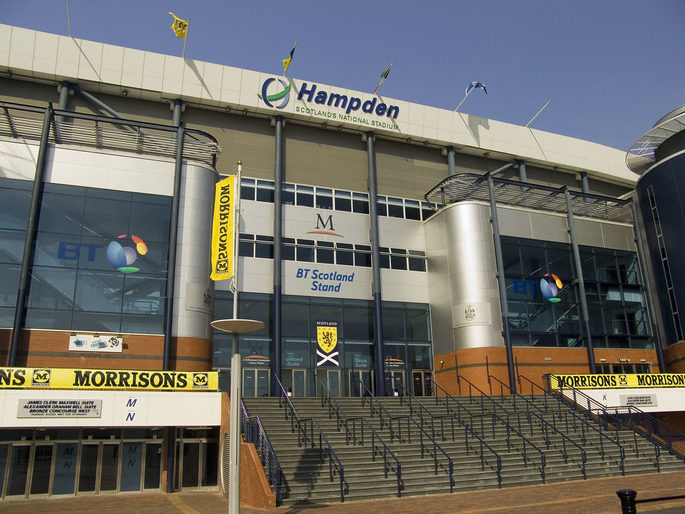
- First Preliminary Round: Saturday 12th August 2023
- Second Preliminary Round: Saturday 2nd September 2023
- First Round: Saturday 23rd September 2023
- Second Round: Saturday 28th October 2023
- Third Round: Saturday 25th November 2023
- Fourth Round: Saturday 20th January 2024
- Fifth Round: Saturday 10th February 2024
- Quarter-Finals: Saturday 9th March 2024
- Semi-Finals: Saturday 20th & Sunday 21st April 2024
- Final: Saturday 25th May 2024, kick-off TBC
Exact fixture dates may vary from the dates shown
About the Scottish Cup
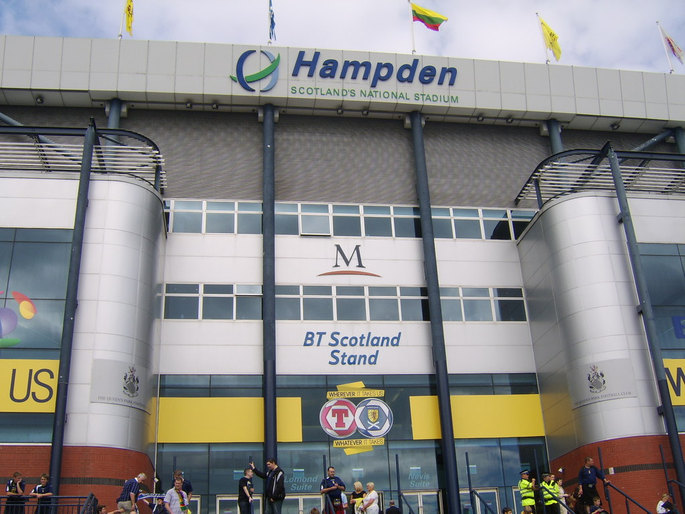
It’s easy for fans of English football to be dismissive of the Scottish game, suggesting that it’s constantly just a two horse race between Glasgow’s Celtic and Rangers. That’s a inaccurate view, even if you don’t know about the recent troubles that the latter team have faced recently and the fact that other clubs have became the challengers to Celtic’s dominance in their absence.
It’s unquestionably true that the Glaswegian clubs have been the dominant forces in Scotland almost since football began to be played north of the border, but that doesn’t mean that all other clubs are de facto also rans; especially not when it comes to talking about the Scottish Football Association Challenge Cup.
After all, even if you only look between the turn of the millennium and 2016 it was won by seven different teams. Unlike the league, which requires sustained success over the course of an entire year, cup finals are one-off occasions that can be won by anyone on the day.
The Scottish Cup was created in 1873, which was the same year that the Scottish Football Association was formed in order to add some semblance of order to the game in Scotland. The Association wanted to come up with a challenge cup in order to give its members an annual competition to take part in, with the first ever game in the tournament occurring on the eighteenth of October 1873. That was a match between Renton and Kilmarnock that the home side won 2-0.
For the earlier rounds of the Scottish FA Cup the venue is dictated by the home side in the match. It’s only once it reaches the semi-final stage of the tournament that a neutral venue is needed for the purposes of hosting the matches. It is traditional for Hampden Park to be used as that neutral venue, having been used for the final since 1874.
At times, of course, Hampden Park is unavailable for some reason and an alternative location needs to be found. In 2014, for example, it was being used to host the final of the Commonwealth Games and so the semi-finals were moved to Ibrox and Celtic Park.
The Early Tournaments
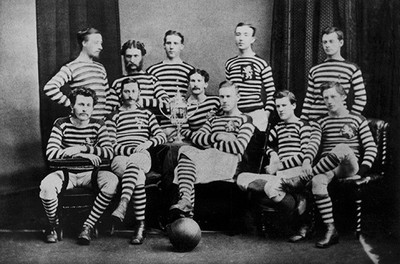
Image via Wikimedia Commons
Whilst it’s common nowadays for one of either Celtic or Rangers to add their name to the trophy, back in the early years it was Queen’s Park that were the dominant force in the newly created Scottish FA Challenge Cup. Now best known as the only amateur club in the Scottish Professional Football League and the side that takes up a tiny portion of Hampden Park when they hold their home matches, they won ten of the first twenty trophies on offer. Indeed, during the competition’s formative years it was common for sides that few modern Scottish football enthusiasts will have heard of to lift the trophy, with all of Vale of Leven, Dumbarton and Renton getting their names etched into it.
As something of a sign of how much the disparity between the lower and upper teams was back in the days when the trophy was first played for, the record score was set just twelve years after the Scottish FA Cup was created. Arbroath might not be considered to be a high-scoring side by today’s football fans, but back then they couldn’t stop scoring when they played Bon Accord in the first round and beat them 36-0. It was a scoreline that hasn’t been bettered since and would probably win the record in most professional cup competitions around the world.
Another noteworthy point from the competition’s early period is the fact that it took Celtic nearly twenty years before they were able to lift the trophy for the first time. Queen’s Park might be looked at as something of a quaint football club by people today, but back in the day they were the Celtic of their time and won the major trophies on a regular basis.
When Celtic beat them 5-1 in a replay of the final after the first game had been made void, therefore, it might have been seen as something of an indication of a shifting in the power balance. Queen’s Park made up for the loss the following year, however, beating the holders in the final to lift the trophy for the tenth time.
A Shift In Power to the Glasgow Giants
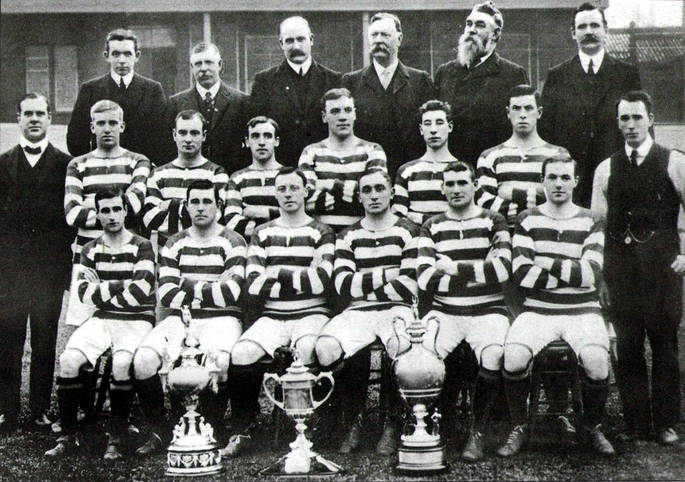
Few could’ve known back then that it would be the last time that Queen’s Park would win the Scottish FA Cup and that it had, in fact, represented a shift in power. The two main Glasgow clubs met in the final the following year, with Rangers winning the Cup for the first time when they beat Celtic 3-1 at Hampden Park.
Despite wins from St. Bernard’s and Heart of Midlothian in the two years after, it was something of a sign of what was to come. Rangers won their second and third Cups back-to-back in 1897 and 1898 and then Celtic responded by winning the next two. Scottish football had been given its first glimpse of what the next hundred plus years would look like.
From Rangers’ second trophy in 1897 through to 1923, there were only nine occasions in which a team other than one of the two Glasgow powerhouses won the Scottish FA Cup. Perhaps that was in part because the Scottish Football Association banned its members from playing in the English FA Cup in 1887, meaning that there was only one trophy that the big boys thought that it was worth concentrating on.
Queen’s Park had twice made the final of the English FA Cup only to miss out to Blackburn Rovers both times, whilst the likes of Partick Thistle and 3rd Lanark RV had also taken part in it until they were banned from doing so. The shift in power was real, with Celtic taking the competition as their own.
The 1909 Old Firm Cup Final
If the early years of Scottish football was a time when the sport was learning about what to expect in the future then the powers that be should’ve learnt a lot from the Cup final of 1909. The 36th edition of the Scottish FA Cup saw Celtic and Rangers going head-to-head in the final at Hampden Park on the tenth of April, with the match ending in a rather thrilling 2-2 draw. A replay occurred a week later and also finished in a draw at the end of normal time, leading many to assume that extra-time would be played to decide a winner. In reality, the rules of the Cup specified that that was only to happen if the match was a draw at the end of the second replay.
As supporters began to realise that there would be no extra-time, rumours started to make their way around the crowd that results were fixed in order to raise the Scottish FA more money from ticket sales. Large portions of the crowd invaded the pitch and the goalposts were torn down in the melee. As the pitch was ripped up and the wooden pay boxes were set on fire, mounted police and the fire brigade were sent in only to also come under attack. With more than one hundred people injured, both the clubs requested that no replay take place and so the medals and the trophy itself were withheld, whilst the Scottish Football Association paid £500 to Queen’s Park, the owners of Hampden Park, and Celtic and Rangers added £150 each to that amount.
Interruptions Due the World Wars
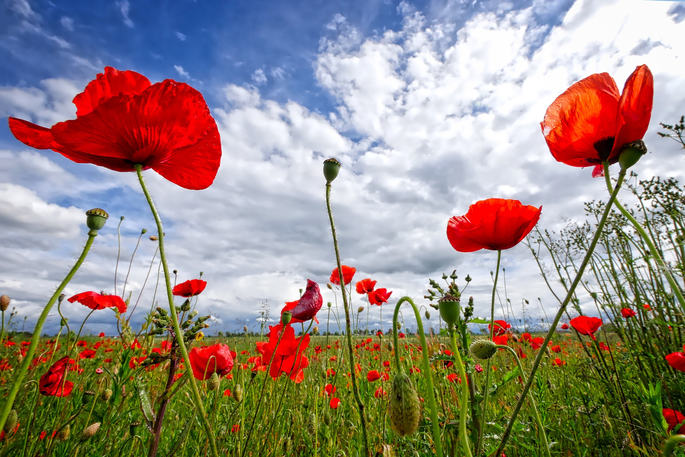
Just five years on from the 1909 final and the competition itself was suspended due to the outbreak of World War One, not resuming again until the 1919-1920 season. It carried on as normal for twenty years, stopping again between 1939 and 1945 when World War Two broke out. Instead, the Scottish War Emergency Cup was played between February and March in 1940, with all sixteen of the league clubs that were still operating in spite of the war taking part in it with Rangers defeating Dundee United 1-0 in the final.
Taking Part In The Tournament
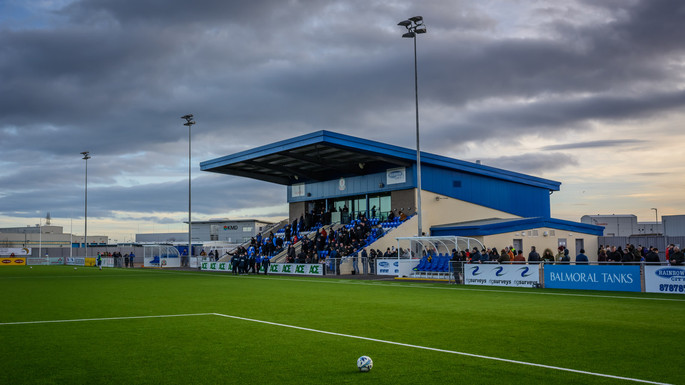
A club that is a member of the Scottish Football Association, whether full or in an associate capacity, is entitled to enter the Scottish FA Cup. Full members, as you’d probably expect, qualify to take part in it automatically, whilst those sides that are not full members need to qualify for the right to play in it. Full members are as follows:
- Any team in the Scottish Professional Football League
- All sides in the Highland League
- All sides in the Lowland League
If a side isn’t a full member then it must win a trophy in order to be eligible to take part in the Scottish FA Cup. The qualifying competitions are as follows:
- Football Leagues in the East of Scotland
- Football Leagues in the South of Scotland
- The South & East Of Scotland Cup-Winners Shield
There are also events that Scottish Junior Football Association clubs can win in order to take part in the main tournament. These include three regional Super League divisions and the Scottish Junior Cup.
When it comes to players and their ability to take part in the tournament, they are allowed to do so provided they are registered with a team that is competing in it. Once they have played a game in the competition, however, they are cup-tied and will not be eligible to play for another side at a latter stage in the same season. Clubs announce eleven players and five substitutes before each game and players have to have been registered for the club they’re playing for in the semi-final. Fielding an ineligible player may result in teams being expelled from the Cup completely.
The Cup Format
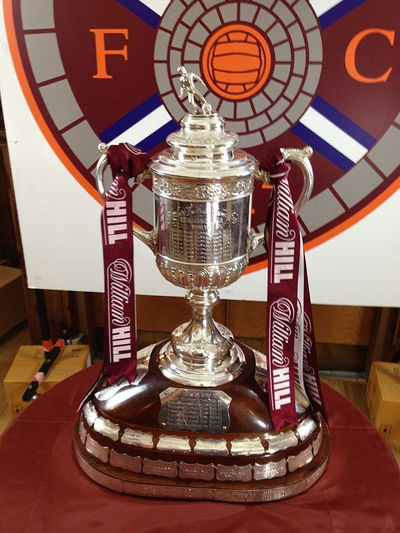
By Blethering Scot, Wikimedia Commons
The Scottish FA Cup gets underway in the middle of August, the same point at which the Scottish football season itself gets underway. The final is normally the last game in the Scottish football calendar and occurs towards the end of May.
As with its English equivalent, the Scottish FA Cup sees the lower ranked teams enter it at earlier stages than those higher up the food chain. There’s a preliminary round that is for the lowest ranked teams in order to ensure that the right number of clubs are present once the tournament proper starts. It is used for sides that have qualified through the Junior and and amateur competitions as well as other clubs that have full membership of the Scottish FA.
Round One tends to see the thirty sides from the Highland and Lowland leagues enter, whilst League Two teams come into the tournament in the second round. The third round is the preserve of the League One and most of the Scottish Championship teams, with four of them and all of the Premiership clubs entering in round four.
The Scottish FA Cup is a knockout competition, with each round being decided according to a random draw that sees the first team out of the hat playing at home. Games last for the usually ninety minutes plus stoppage time and the winner makes it into the draw for the next round. A draw sees the match replayed at the away team’s home ground, with extra-time and penalties being used to decide the winner if it’s also a draw after ninety minutes. As an aside, the final also used to go to a replay, with that practice being abandoned in 1981.
Qualifying For Europe
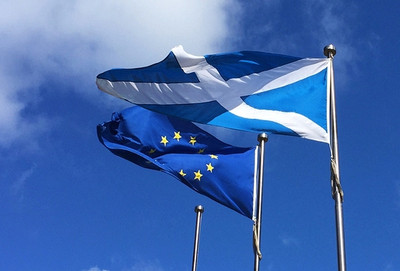 It’s not uncommon for Football Associations to add qualification for Europe to the prize that teams get for winning a cup in order to maintain interest and ensure competitiveness. That’s exactly what the Scottish Football Association chose to do with their Challenge Cup, with winners being entered into the UEFA Cup Winners’ Cup between 1960 and 1998. When the Cup Winners’ Cup was abolished a place in the UEFA Cup was awarded to Cup winners instead, with the practice continuing to this day in the form of the rebranded Europa League.
It’s not uncommon for Football Associations to add qualification for Europe to the prize that teams get for winning a cup in order to maintain interest and ensure competitiveness. That’s exactly what the Scottish Football Association chose to do with their Challenge Cup, with winners being entered into the UEFA Cup Winners’ Cup between 1960 and 1998. When the Cup Winners’ Cup was abolished a place in the UEFA Cup was awarded to Cup winners instead, with the practice continuing to this day in the form of the rebranded Europa League.
Should the winning side already have qualified for European competition through another means, the place in the Europa League shifts not to the runners-up but to the highest placed team in the Premiership that didn’t make it into Europe thanks to their league position.
Interesting Facts
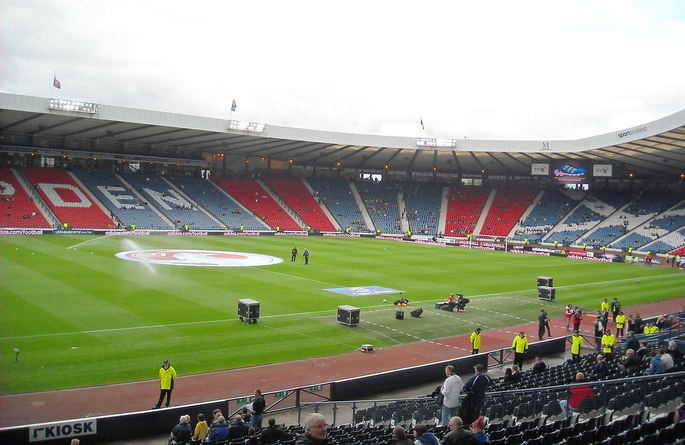
Speaking of using Hampden Park as the location for the final, it holds the record for attendance in a match played in Europe. The final of 1937 saw more than 147,000 people turn up to watch Aberdeen lose 2-1 to Celtic as the Bhoys picked up their fifteenth Scottish FA Cup. Here are some other interesting facts you might like to know:
- At the time of writing, Celtic hold the record for the most wins of the Scottish FA Cup with 41, which is 7 more than Rangers with 34
- Celtic have also appeared in the final more than any other side, doing so on 59 occasions
- Hamilton Academical are the ‘unluckiest’ team in the competition, having reached two finals but never won it
- Eight other teams have made the final once without success
- A team that wins the Cup and another trophy is said to have ‘done the Double’, whilst those that match it with two other trophies has won a ‘Treble’
- the Scottish FA Cup has enjoyed numerous sponsors over the years, resulting in a name change accordingly. From 2008-2010, for example, it was sponsored by the Scottish government and named the Homecoming Scottish Cup
